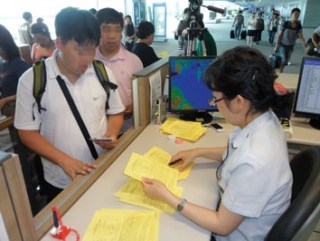Government Strengthens Management of Foreign TB Patients: Patients Who Do Not Cooperate with Treatment Will Have Their Extension of Stay Restricted or Be Forced to Leave the Country
According to the new government policy, if a foreigner at high-risk of TB applies for a long-stay visa, he will have to submit a medical report and if a foreign TB patient does not cooperate with treatment, the government can force the patient to leave the country.
On March 8, the Centers for Disease Control and Prevention announced that the government implemented measures to manage foreign TB patients with the cooperation of relevant ministries.

With a goal to reduce the number of tuberculosis cases to half by 2020, the government established a comprehensive TB management plan. The instances of tuberculosis in Korea has dropped according to this plan, but in the recent five years, the number of TB patients entering the country from abroad has increased.
The number of foreign TB patients has increased nearly three-fold from 637 in 2009 to 1,858 in 2014.
Specifically, if a foreigner at high-risk of TB applies for a long-stay (over 91 days) visa, the Ministry of Justice can request a medical report issued by a hospital designated by a Korean diplomatic mission overseas.
Countries at high-risk of TB refer to those with more than 50 TB patients for every 100,000 of the population and includes eighteen countries with many people qualified to stay in Korea and with many employed or studying in the country.
The government will restrict the issuance of visas for TB patients until they were cured.
The justice ministry announced, "The new measures in place aim to block the inflow of TB and are as strong as those implemented by advanced countries. The goal is to fundamentally block the inflow of TB patients. This policy also took into consideration the gravity of the present TB cases in Korea."
In the case of foreigners who caught TB during their stay in Korea (including multidrug resistant tuberculosis patients), they can receive the same treatment as Korean nationals, but patients who do not cooperate with the treatment (refuse or suspend treatment) will be classified as "critical TB control patients" and be restricted when applying for an extension of stay, forced to leave the country, and will be restricted in reentering the country.
When such patients try to reenter the country, they will be directed to the health center in the quarantine stage and be tested for TB.
Meanwhile, the government will also establish a system connecting the nation's health centers, national and metropolitan TB hospitals, and the immigration office to establish organic measures to control TB.
Accordingly, health centers will screen foreigners who apply for an extension of stay or seek to change visas for TB, national and metropolitan TB hospitals will treat the critical TB control patients while the disease is contagious, and the immigration office will permit various types of entry for those who cooperate with treatment in connection to the health centers.
The Centers for Disease Control and Prevention said, "The stronger management of foreign TB patients will be able to block the inflow of TB from overseas and prevent the spread of the disease by those who do not cooperate with treatment."

